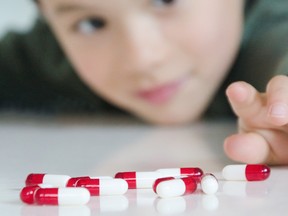“They’re not child proof. Nothing is child proof. They’re child resistant. Depending on the child, it’s a matter of just minutes or seconds before they’re into that medication.”

Article content
A physician at the Stollery Children’s Hospital is concerned about the number of cases he sees of poisonings among children aged 0-5 related to medications.
“There hasn’t been a significant change in numbers, but they’re certainly not decreasing,” said Dr. Andrew Dixon, a physician for 15 years.
Article content
“It comes down to a bit of forgetfulness among parents and caregivers. You take something out of the cupboard and forget to put it back and the child finds it. They see nice colours and something that may look like candy to them, and they eat it.”
Advertisement 2
Article content
Alberta Health Service’s Poison and Drug Information Service (PADIS) received 2,696 calls of potential poison exposure in children aged five and under in the Edmonton area in 2023. A total of 1,891 of those calls came directly within Edmonton.
Across the province, PADIS annually receives more than 9,500 calls a year relating to children aged five and under. That averages out to six out of every 10 calls and 27 calls a day.
PADIS offers free and confidential telephone advice 24 hours a day from public and health care professionals on poisons, chemicals, medicines, and herbal supplements. This service provides emergency advice about poisonings and poison education and prevention.
Not all calls led to hospital admissions and several of these cases would be managed through home care and direction from PADIS, but it’s a stark reminder to all parents and caregivers to keep medications out of reach and out of sight of young children.
‘Be mindful’
“It comes down to education of parents and caregivers to be mindful of where they’re storing their medications. They need to be out of reach of children,” said Kathy Belton, director of the Injury Prevention Centre based in the University of Alberta’s school of public health.
Article content
Advertisement 3
Article content
“I think because over-the-counter medications and medications are so common place in our world, we don’t often think of them as things that can harm, because most of the time medications are prescribed for a person’s good.“
While Belton said often parents aren’t storing medications away from children properly, which lead to incidents, she also says some people have a false sense of security when it comes to “child-proof” bottles.
“They’re not child-proof. Nothing is child-proof. They’re child-resistant. Depending on the child, it’s a matter of just minutes or seconds before they’re into that medication,” said Belton.
Belton said she’s seeing a number of cases where grandparents are moving into the home, or visiting, and may have medications in their purses or jackets that children are apt to find.
Belton says the best way to prevent poisoning among young children is for parents to keep medications stored in high places and out of reach of children.
“It’s an added stress and cost, that quite frankly our health care system is overburdened as is. We could alleviate some of the stress on our health care system if people took the proper precautions,” said Belton.
Advertisement 4
Article content
Belton said that parents and caregivers also need to be aware when administering medication to children. She’s seen situations where a parent or caregiver may have not checked to see if the medication has been given already, leading to an excess dosage.
She also says that medication needs to be given in the proper manner.
“We’re trying to encourage parents to use proper technique to administer medication. Now that all the spoons aren’t the same size, that’s an issue,” said Belton.
“We encourage parents to use a syringe or medication cup, because then the child is actually getting the appropriate dose.”
‘Way too much for little hands’
Belton says there are a number of household items and other products around a person’s home that can cause problems, too.
“Hand sanitizer is common. Kids mimic what parents would do with the hand sanitizer, and then put their hands in their mouth. The amount you’d typically use is meant for an adult hand, and it’s way too much for their little hands,” said Belton.
“A lot of homes have sage products, those essential oils can be poisonous. Things like vitamin D, melatonin, cosmetics. There are a whole host of things that can cause a child to get sick if they ingest it.”
Advertisement 5
Article content
Dixon says that many of the poison cases he sees involving medication at the Stollery are treatable, but he said he’s seen an increase in cases involving children ingesting marijuana edibles, laundry pods and button-sized batteries.
“Young children who ingest marijuana edibles can cause some big issues,” said Dixon.
“Laundry pods are very serious and button batteries, they’re the most dangerous. They can burn a child’s esophagus.”
Recommended from Editorial
Article content





